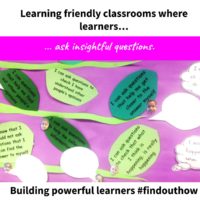What do we mean by Questioning ?
Questioning means both the ability to ask good questions and the disposition to do so (which is sometimes called curiosity). Good learners like questions, and are not afraid of the ‘don’t know’ state of mind out of which questions emerge.
Good learners like to wonder about things. For them, it often really is a wonder-ful world. The phrases ‘How come?’ and ‘What if?’ are never far from their lips.
They value getting below the surface of things, and are less likely to accept uncritically what they are told. They like to come to their own conclusions. They are more willing to reveal their questions and uncertainties if they think it will help them learn.
Questioning can be as much non-verbal as it is verbal. Playing around with materials or ideas just to see what happens is a powerful way of asking questions. It is what artists and inventors spend a lot of their time doing. The inclination to ask questions flourishes when you are around people who are also asking questions, and who encourage and appreciate your questions too.
A well formed Questioning habit involves being ready, willing, and able to:
- Be curious about all experiences;
- Dig beneath the surface, asking why something is happening as it is;
- Play with ideas and possibilities;
- Be systematic and adopt a logical approach — exploring a line of thought purposefully; posing questions that follow a rational path towards an emerging goal;
- Be socially aware in asking questions of others, exhibiting genuine interest in other people;
- Be comfortable with uncertainty and ambiguity; enjoy different points of view and contrary evidence.
Spot the questioners in your classes
Just to get you tuned in – have a quick think about ‘Questioners you may know’. Make a note of students you know who display these characteristics.
Becoming a teacher who develops students’ learning power means developing a keen awareness of the subtleties of your students’ learning behaviours.
What do you think?
- How many of your students come to mind when looked at through the lens of questioning?
- Is there a gender balance or have you noted down more girls than boys or vice versa?
- Are the students you have noted from across all age groups or do some dominate?
- How do these questioning characteristics help these students to be better learners?
Make a note of…
- Those groups or classes that seem to have lots of good questioning characteristics.
- How you think you might capitalise on this.
A questioning activity for any subject
Engage with a ‘mystery’ object in a bag
 Invite students to ask questions to find out what the mystery object is.
Invite students to ask questions to find out what the mystery object is.
- Vary the complexity according to age and experience of class. Use clues to narrow down the possibilities for younger children e.g. it’s something you’d find in the garden. Young children will tend to want to ‘guess’. They will need encouragement to ask questions before offering solutions.
- Ask talk partners to come up with two ‘I wonder’ questions e.g.” I wonder what it’s made of?”
- Set a limit, say 10/15/20 questions allowing the children to guess before showing the object.
- Key is to focus on the questions; acknowledge and reward good questions.
- At the end compile a list of some of the useful/unusual/interesting questions that were asked.



Love this idea! I wonder what? Students could work in groups, on butchers paper to develop, write and then present questions. Considering using the mystery bag to introduce a science ‘mixtures’ unit and possibly have a cake and examples of the ingredients of the cake in the bag.